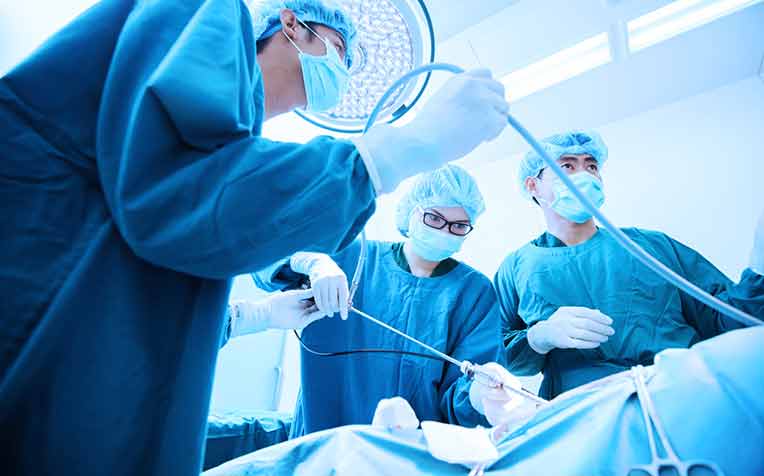
Keyhole surgery or laparoscopic surgery can be used to treat colorectal cancer, even on elderly patients, with no increased risk of complications compared to conventional open surgery.
What is keyhole surgery or laparoscopic surgery?
Keyhole surgery or laparoscoic surgery involves the use of devices and instruments, which are inserted through tiny incisions and controlled remotely to perform the operation. The use of robots advances keyhole surgery as the combination of robotics, special miniature instruments and computer-enhanced technology complements the surgeon’s skills.
Treating colorectal cancer with keyhole surgery (laparoscopic surgery): What are the benefits?
Keyhole surgery or laparoscopic surgery can be used to treat colorectal cancer in elderly patients with no increased risk of post-operative complications, compared to conventional open surgery, as shown in a study by Singapore General Hospital (SGH). And if colorectal cancer patients are fit enough to undergo surgery, then keyhole surgery (laparoscopic surgery) – performed through tiny incisions with the aid of tiny cameras that magnify the surgical area on a viewing screen – should be offered to them as an option, the study said.
Dr Tan Wah Siew, Consultant, Department of Colorectal Surgery, Singapore General Hospital (SGH), a member of the SingHealth group, said: “What we discovered is that age is no barrier at all. Our study found that colorectal cancer patients who underwent keyhole surgery had better outcomes in terms of faster recovery, a shorter hospital stay and less pain.”
Keyhole surgery (laparoscopic surgery) is safe for elderly colorectal cancer patients
The aim of the study, she said, was to prove that elderly patients with colorectal cancer can undergo keyhole surgery or laproscopic surgery without a higher risk of complications, and they should be offered the benefit of having it. Researchers also wanted to find out if older patients face more complications from the longer time under anaesthesia. Keyhole surgery (laparoscopic surgery) takes slightly longer than conventional surgery as it is technically more intricate.
Dr Tan said: “Our numbers showed that elderly colorectal cancer patients who went through this surgery didn’t come out with a higher complication rate than those who had open surgery.”
More than 700 patients aged 70 to 95, who had both open and keyhole surgery (laparoscopic surgery) between 2005 and 2008, were studied retrospectively. Although it was not a randomised study, the sheer number of patients involved in the study “made the results more likely to be accurate,” Dr Tan said.
Typically, depending on complexity, conventional open surgery for colorectal cancer treatment can take from half an hour to slightly over four hours, while keyhole surgery (laparoscopic surgery) usually requires one to six hours, she added.
“But we found elderly colorectal cancer patients were not compromised by this. (General anaesthetic-related) complications are mainly post-op. It seemed there might be a higher risk related to keyhole surgery, but we discovered there wasn’t. The rate of complications was similar, not higher,” she said.
Apart from a shorter convalescence, patients also needed less morphine for pain, so morphine-induced side effects, such as nausea, vomiting, constipation, and problems urinating, were reduced.
Keyhole surgery (laparoscopic surgery) is safe
Dr Tan describes keyhole surgery (laparoscopic surgery) as “technically more difficult and challenging than conventional open surgery”, but said there are sufficient trained and experienced surgeons in SGH to be able to offer this procedure to any patient who wants it and is suitable for it.
Not all patients are the same, though. “You can have a 90-year-old who is fit and another who is bed-bound and frail. But some patients should be offered it,” she said.
“The most important thing is safety. If this cannot be assured, we won’t do it or insist on it, and put the patient’s life in danger. For example, if a tumour is too advanced, we may revert to performing open surgery.”
Keyhole surgery (laparoscopic surgery) has been practised for 15 years and has become established in the last five years. The use of robots in more recent years has advanced keyhole surgery (laparoscopic surgery), as the combination of robotics, special miniature instruments and computer-enhanced technology has improved the surgeon’s skills.
The study took second place in the Best Oral Paper Award (Clinical), at the SGH 19th Annual Scientific Meeting held in April 2011. Dr Tan led the team of doctors, mainly from SGH’s Department of Colorectal Surgery, as well as Yong Loo Lin School of Medicine, National University of Singapore.
Contributed by

















 Get it on Google Play
Get it on Google Play